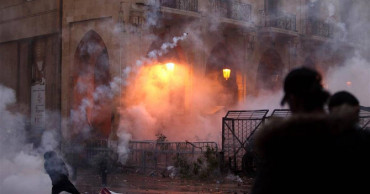riot
Haunted by post-election riot, Brazil’s Lula reins in army
When rioters stormed Brazil’s top government buildings in January to dispute the outcome of the presidential election, many soldiers stood by as far-right protesters broke windows, defecated in offices and destroyed valuable art.
The images from Brasilia that day still haunt the left-leaning government of President Luiz Inácio Lula da Silva. He has strived ever since to ensure that military leaders defend South America’s largest democracy and stay out of politics.
The threat isn't just hypothetical. Brazil has lived through four military coups – the most recent one in 1964, followed by two decades of brutal dictatorship.
Also Read: Bolsonaro says he may return to Brazil in the coming weeks
Lula’s task is fraught. The military is filled with supporters of ex-president Jair Bolsonaro, and its role in the new government is being diminished by the day.
Lula has already tapped more than 100 civilians to replace military officers Bolsonaro appointed to key positions, and he has moved oversight of the country's intelligence agency to his chief of staff's office, among other changes.
“Lula needed to manage his relationship with the military to be able to govern, and will continue to do so,” said Carlos Melo, a political science professor at Insper University in Sao Paulo.
Melo said Brazil's military has long believed that it has "some kind of guardianship of the country’s political process," and Bolsonaro only fueled that belief.
Also Read: Brazil deluge toll hits 44 as search continues for missing
Bolsonaro, a former army captain, appointed more than 6,000 military officers to jobs across his government and revived an annual commemoration of the 1964 coup to stoke nostalgia for the days of military rule.
Although that era was marked by human rights abuses and the loss of civil liberties, Bolsonaro and many of his supporters remember it fondly as a time of strong nationalism, economic growth and conservative values. They view Lula's efforts to tame the military as heavy-handed and misguided.
“Stop looking through the rearview mirror and govern for all Brazilians,” Bolsonaro's former vice president, Gen. Hamilton Mourão, who is now a senator, said in an interview.
The most significant move Lula has made so far has been to elevate Gen. Tomás Paiva to be the army’s top commander.
Paiva, 62, has pledged to keep soldiers out of politics and to respect the results of October’s election, in which Lula beat Bolsonaro by a razor-thin margin.
Yet Paiva has also acknowledged that most the military’s leaders voted for Bolsonaro, and he lamented Lula’s victory to subordinates just three days before the new president called to offer him the promotion — comments he later said were misinterpreted.
Lula has taken various other steps aimed inoculating Brazil from the risk of another violent uprising with at least tacit support from some in the military:
— He blocked the appointment of a Bolsonaro loyalist to command the Goiania battalion, based an uncomfortably close 124 miles from the capital.
— He placed the country’s intelligence agency — formerly overseen by members of the military — under the office of his chief of staff, which is led by civilians.
— He took a symbolically important trip to the U.S., which before the election had warned Brazilian military leaders to steer clear of politics if they wanted access to arms purchases and cooperation from American armed forces.
For now, there is no evidence of another uprising being planned or of military leaders questioning Lula's orders, according to a high-ranking official in the army and a person who works closely with the defense minister, both of whom spoke on condition of anonymity because they weren't authorized to speak publicly.
Lula enlisted the military’s cooperation twice in February: as part of a massive operation to expel some 20,000 illegal miners from the Yanomami Indigenous area in Brazil’s Amazon, and to help rescue people after mudslides near Sao Paulo.
These represented early tests of the relationship between Lula and the military, and the results were very positive, said political consultant Thomas Traumann. Still, there's no guarantee of long-term stability, he said.
It remains to be seen whether military retirees and active duty service members who either took part in the Jan. 8 riots or turned a blind eye to them will receive punishment. Some analysts believe that would be important to deter future action.
One video from Jan. 8 showed policemen at the presidential palace in the rare position of barking orders at soldiers: “Lead your troops!” one officer shouted at members of the presidential guard, which is part of the army.
Another video showed dozens of rioters surrounded by police in the palace, as a general attempts to free them. “Are you nuts?” a policeman asks. “They’re in custody!”
Hundreds of civilians who participated in the riots have been jailed and dozens indicted. But service members have so far been spared. The military prosecutors’ office and the top military court have opened 17 investigations, although neither has been transparent about the process.
The incoming Chief Justice of Brazil’s Superior Military Court, Joseli Camelo, said he was encouraged recently when the army canceled a plan to commemorate the upcoming anniversary of the 1964 military coup, a dictatorship-era tradition that Bolsonaro revived.
“This is just another demonstration that the commander is aligned with all the powers towards our common challenge, which is to pacify Brazil and definitively reinforce democracy in our country,” Camelo said.
Mourão, Bolsonaro's former vice president, says the military should not spare any of its members who are proven guilty of taking part in the riots. “The armed forces are shaped to be rigorous in the investigation of disciplinary errors and military crimes,” he said.
Even before taking office in January, Lula — who served as president from 2003-2010 — knew it was essential for him to bolster ties with the country’s right-leaning military.
Some highly regarded military leaders had openly derided him before the election, and some even campaigned to reelect Bolsonaro. For months, the army permitted anti-Lula protesters who were openly supportive of a military coup against him to camp outside their barracks.
In Lula’s first two presidential terms, his relationship with the military was marked by conciliation rather than confrontation, said Fabio Victor, a journalist who just published a best-selling book on Brazil’s armed forces and politics. But Jan. 8 appears to have altered his calculus.
In contrast with Bolsonaro's administration, few members of the armed forces work at the presidential palace, Victor said. With an eye toward the future, Lula's allies in Congress are pushing for constitutional changes that would more clearly define the military's powers and limits, and his ministers are looking at overhauling military education.
“Lula today is very suspicious of the military,” Victor said.
2 years ago
Top Brazil court greenlights probe of Bolsonaro for riot
A Brazilian Supreme Court justice on Friday authorized an investigation of whether former president Jair Bolsonaro incited the Jan. 8 riot in the nation’s capital, as part of a broader crackdown to hold responsible parties to account.
According to the text of his ruling, Justice Alexandre de Moraes granted the request from the prosecutor-general's office, which cited a video Bolsonaro posted on Facebook two days after the riot. The video claimed Luiz Inácio Lula da Silva wasn't voted into office, but rather was chosen by the Supreme Court and Brazil's electoral authority.
Prosecutors in the recently formed group to combat anti-democratic acts argued earlier Friday that, although Bolsonaro posted the video after the riot, its content was sufficient to justify investigating his conduct beforehand. Bolsonaro deleted it the morning after he first posted it.
Otherwise, Bolsonaro has refrained from commenting on the election since his Oct. 30 defeat. He repeatedly stoked doubt about the reliability of the electronic voting system in the run-up to the vote, filed a request afterward to annul millions of ballots cast using the machines and never conceded.
He has taken up residence in an Orlando suburb since leaving Brazil in late December and skipping the Jan. 1 swearing-in of his leftist successor, and some Democratic lawmakers have urged President Joe Biden to cancel his visa.
Read more: Roots of the Brazilian capital’s chaotic uprising
Following the justice's decision late Friday, Bolsonaro’s lawyer Frederick Wassef said in a statement that the former president “vehemently repudiates the acts of vandalism and destruction” from Jan. 8, but blamed supposed “infiltrators” of the protest — something his far-right backers have also claimed.
The statement also said Bolsonaro “never had any relationship or participation with these spontaneous social movements.”
Brazilian authorities are investigating who enabled Bolsonaro's radical supporters to storm the Supreme Court, Congress and presidential palace in an attempt to overturn results of the October election. Targets include those who summoned rioters to the capital or paid to transport them, and local security personnel who may have stood aside to let the mayhem occur.
Much of the attention thus far has focused on Anderson Torres, Bolsonaro’s former justice minister, who became the federal district’s security chief on Jan. 2, and was in the U.S. on the day of the riot.
De Moraes ordered Torres’ arrest this week and has opened an investigation into his actions, which he characterized as “neglect and collusion.” In his decision, which was made public Friday, de Moraes said that Torres fired subordinates and left the country before the riot, an indication that he was deliberately laying the groundwork for the unrest.
The court also issued an arrest warrant for the former security chief, and he must return within three days or Brazil will request his extradition, Justice Minister Flávio Dino said Friday.
“If by next week his appearance hasn’t been confirmed, of course we will use mechanisms of international legal cooperation. We will trigger procedures next week to carry out his extradition,” Dino said.
Torres has denied wrongdoing, and said Jan. 10 on Twitter that he would interrupt his vacation to return to Brazil and present his defense. Three days later, that has yet to occur.
The minister pointed to a document that Brazilian federal police found upon searching Torres' home; a draft decree that would have seized control of Brazil's electoral authority and potentially overturned the election. The origin and authenticity of the unsigned document are unclear, and it remains unknown if Bolsonaro or his subordinates took any steps to implement the measure that would have been unconstitutional, according to analysts and the Brazilian academy of electoral and political law.
Read more: Pro-Bolsonaro rioters storm Brazil’s top government offices
But the document “will figure in the police investigation, because it even more fully reveals the existence of a chain of people responsible for the criminal events,” Dino said, adding that Torres will need to inform police who drafted it.
By failing to initiate a probe against the document's author or report its existence, Torres at very could be charged with dereliction of duty, said Mario Sérgio Lima, a political analyst at Medley Advisors.
Torres said on Twitter that the document was probably found in a pile along with others intended for shredding, and that it was leaked out of context feed false narratives aimed at discrediting him.
Dino told reporters Friday morning that no connection has yet been established between the capital riot and Bolsonaro.
The federal district’s former governor and former military police chief are also targets of the Supreme Court investigation made public Friday. Both were removed from their positions after the riot.
Also on Friday night, the popular social media accounts of several prominent right-wing figures were suspended in Brazil in response to a court order, which journalist Glenn Greenwald obtained and detailed on a live social media broadcast.
The order, also issued by Justice de Moraes, was directed at six social media platforms and established a two-hour deadline to block the accounts or face fines. The accounts belong to a digital influencer, a YouTuber recently elected federal lawmaker, a podcast host in the mold of Joe Rogan, and an evangelical pastor and senator-elect, among others.
3 years ago
At least 13 killed in Ecuador prison riot
At least 13 inmates were killed and another two injured in a prison riot on Monday in the Ecuadorean city of Santo Domingo following a fight among inmates in the prison.
The National Police, the Armed Forces and the Ministry of Public Health were called to the emergency and the situation was brought under control, the National Comprehensive Care Service for Persons Deprived of Liberty said in a report.
The same prison was hit by violence on May 9, resulting in the death of 44 inmates.
Read: Earthquake shakes Ecuador’s coast, teen killed by power line
The Ecuadorean prison system has been afflicted with a serious crisis due to confrontations between rival drug trafficking gangs.
In 2021, the country saw a wave of prison riots that left more than 300 inmates dead. The government has declared a crackdown on drug trafficking.
3 years ago
Ecuador declares prison emergency after 118 killed in riot
Ecuador's president has declared a state of emergency in the prison system following a battle among gang members in a coastal lockup that killed at least 118 people and injured 79 in what authorities say was the worst prison bloodbath ever in the country.
Officials said at least five of the dead were found to have been beheaded.
Dozens of police and military vehicles, as well as ambulances, entered the prison compound on Thursday. Helicopters flew over the area.
There could be more bodies or seriously injured people in the prison, said Col. Tannya Varela, the national police commander.
Hundreds of people gathered outside the crime lab in Guayaquil, hoping to collect the bodies of relatives they believed were killed in the prison. The prosecutors’ office said on Twitter that police were working to identify bodies.
Henry Coral, a police official, asked family members to help speed the identification of bodies by telling authorities about any tattoo, scar or other distinguishing feature of prisoners believed to have been killed. Some bodies were mutilated or burned, making identification harder.
President Guillermo Lasso decreed a state of emergency Wednesday, which will give the government powers that include deploying police and soldiers inside prisons. The order came a day after bloodshed at the Litoral penitentiary in Guayaquil that officials blamed on gangs linked to international drug cartels fighting for control of the facility.
“It is regrettable that the prisons are being turned into territories for power disputes by criminal gangs,” Lasso said, adding that he would act with "absolute firmness” to regain control of the Litoral prison and prevent the violence from spreading to other penitentiaries.
Images circulating on social media showed dozens of bodies in the prison’s Pavilions 9 and 10 and scenes that looked like battlefields. The fighting was with firearms, knives and bombs, officials said. Earlier, regional police commander Fausto Buenaño had said that bodies were being found in the prison’s pipelines.
Outside the prison morgue, the relatives of inmates wept, with some describing to reporters the cruelty with which their loved ones were decapitated and dismembered.
“In the history of the country, there has not been an incident similar or close to this one,” said Ledy Zúñiga, the former president of Ecuador's National Rehabilitation Council.
Zúñiga, who was also the country's minister of justice in 2016, said she regretted that steps had not been taken to prevent another massacre following deadly prison riots last February.
Earlier, officials said the violence erupted from a dispute between the “Los Lobos” and “Los Choneros” prison gangs.
Col. Mario Pazmiño, the former director of Ecuador's military intelligence, said the bloody fighting shows that “transnational organized crime has permeated the structure" of Ecuador's prisons, adding that Mexico's Sinaloa and Jalisco New Generation cartels operate through local gangs.
“They want to sow fear,” he told The Associated Press on Wednesday, urging the government to temporarily cede control of the prisons to the National Police. “The more radical and violent the way they murder,” the more they achieve their goal of control, he added.
Luis Hernández, an analyst on political and military affairs who was a general in Ecuador's army, said imprisoned gang members extend their control from prisons to the streets, managing debts, deliveries and other aspects of the illegal drug trade.
Ecuador is a key transit point for drug trafficking organizations because of its good road infrastructure, three international maritime ports and two international airports, Hernández said.
Ecuador's president said that care points had been set up for relatives of the inmates with food and psychological support. He added that a program to address the country's prisons will be accelerated, starting with investments in infrastructure and technology in the Litoral prison.
The former director of Ecuador's prison bureau, Fausto Cobo, said that inside penitentiaries authorities face a “threat with power equal to or greater than the state itself.” He said that while security forces must enter prisons with shields and unarmed, they are met by inmates with high-caliber weapons.
In July, the president decreed another state of emergency in Ecuador’s prison system following several violent episodes that resulted in more than 100 inmates being killed. Those deaths occurred in various prisons and not in a single facility like Tuesday's massacre.
Previously, the bloodiest day occurred in February, when 79 prisoners died in simultaneous riots in three prisons in the country. In July, 22 more prisoners lost their lives in the Litoral penitentiary, while in September a penitentiary center was attacked by drones leaving no fatalities.
4 years ago
Rioting, looting continues in South Africa, deaths up to 32
South Africa’s rioting continued Tuesday with the death toll rising to 32 as police and the military struggle to quell the looting and violence in Gauteng and KwaZulu-Natal provinces.
Many of the deaths occurred in chaotic stampedes as scores of people looted food, electric appliances, liquor, and clothing from retail centers, KwaZulu-Natal premier Sihle Zikalala told the press on Tuesday morning.
“Yesterday’s events brought a lot of sadness. The number of people who have died in KwaZulu-Natal alone stands at 26. Many of them died from being trampled on during a stampede while people were looting items,” said Zikalala.
Also read: Former South African president Zuma to face corruption trial
In Gauteng, South Africa’s most populous province which includes the largest city, Johannesburg, six people have died, said officials.
The deployment of 2,500 soldiers to support the South African police has not yet stopped the rampant looting although arrests are being made at some areas in Johannesburg, including Vosloorus in eastern Johannesburg.
Looting continued Tuesday in Johannesburg shopping malls in township areas including Jabulani Mall and Dobsonville Mall in Soweto. There were also reports of continued looting in centers in KwaZulu-Natal.
Also read: COVID-19 corruption puts 'lives at risk' in South Africa
The violence started in KwaZulu-Natal last week as protests against the imprisonment of former President Jacob Zuma, who began serving a 15-month sentence for contempt of court. He was convicted of defying a court order to testify before a state-backed inquiry probing allegations of corruption during his term as president from 2009 to 2018.
The sporadic pro-Zuma violence spiraled into a spree of criminal theft in poor, township areas of the two provinces, according to witnesses. So far the lawlessness has not spread to South Africa’s other nine provinces.
The Constitutional Court, the country’s highest court, heard Zuma’s application to have his sentence rescinded on Monday. Zuma’s lawyer presented his arguments that the top court made errors when sentencing Zuma to prison. After 10 hours of testimony on Monday, the court judges said they would study the arguments and announce their decision at a later date.
4 years ago
A year on, India's riot victims say justice still unserved
The shooter shouted “Victory to Lord Ram,” the Hindu god, before pulling the trigger that sent a bullet into Muhammad Nasir Khan’s left eye.
5 years ago
Sri Lankan prison riot leaves 6 inmates dead, 35 injured
Six inmates were killed and 35 others were injured when guards opened fire to control a riot at a prison on the outskirts of Sri Lanka’s capital, officials said Monday. Two guards were critically injured, they said.
5 years ago
100 injured in clashes between protesters, riot police in Lebanon's capital
Heavy clashes broke out on Saturday in downtown Beirut between protesters and the riot police, causing at least 100 injuries, TV channel MTV reported.
6 years ago



.jpg)

.jpg)
.jpg)




